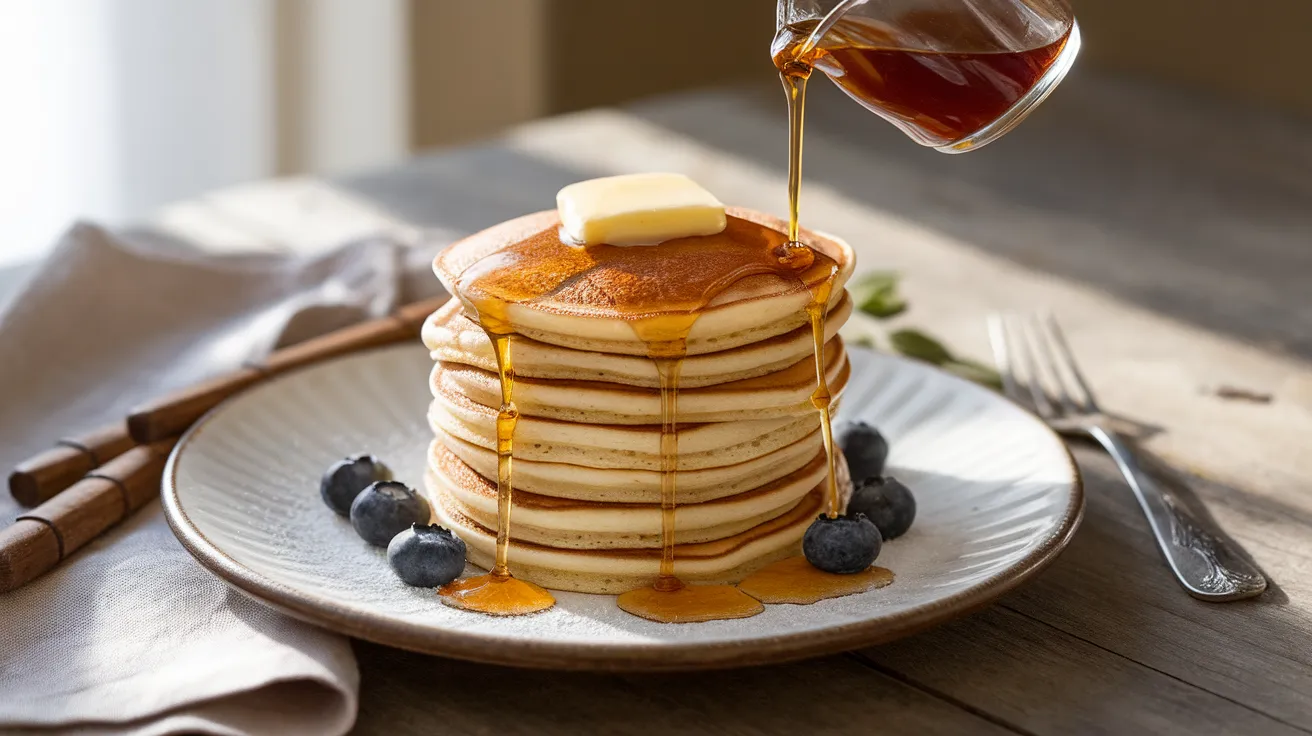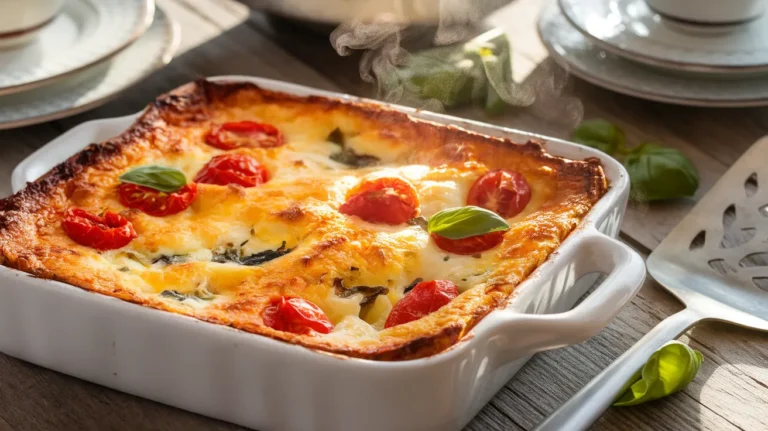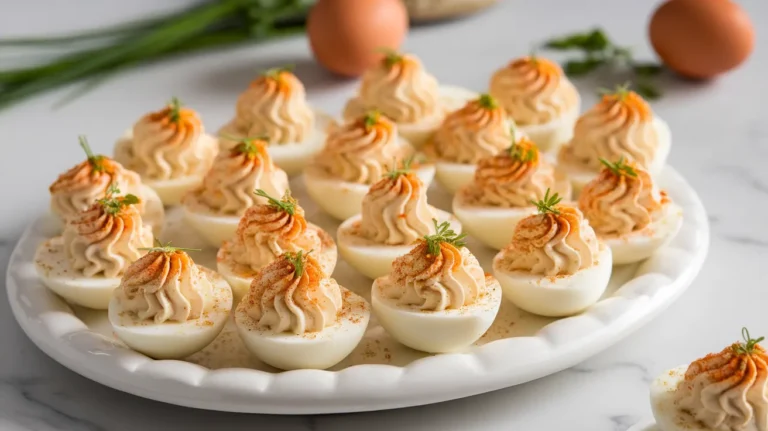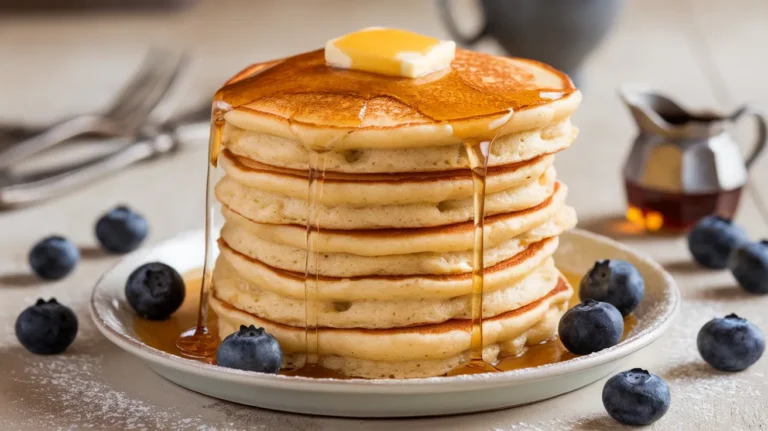These ricotta buttermilk pancakes are the secret to breakfast perfection – incredibly fluffy, tender, and with a subtle tang that makes them irresistible. The creamy ricotta creates pockets of moisture while buttermilk adds that classic pancake flavor, making each bite melt-in-your-mouth delicious.
SERVES: 4 | PREP: 15 MIN | COOK: 20 MIN | TOTAL: 35 MIN
Ingredients for Ricotta Buttermilk Pancakes
Dry Ingredients
| Ingredient | Measurement |
|---|---|
| All-purpose flour | 1½ cups |
| Granulated sugar | 2 tablespoons |
| Baking powder | 2 teaspoons |
| Baking soda | ½ teaspoon |
| Salt | ¼ teaspoon |
Wet Ingredients
| Ingredient | Measurement |
|---|---|
| Whole milk ricotta cheese | 1 cup |
| Buttermilk | 1 cup |
| Large eggs | 2 |
| Vanilla extract | 1 teaspoon |
| Melted butter | 3 tablespoons |
For Cooking
| Ingredient | Measurement |
|---|---|
| Butter or oil for griddle | As needed |
Step-by-Step Instructions for Perfect Ricotta Buttermilk Pancakes
Phase 1: Preparing the Dry Mix (2 minutes)
Step 1: Grab a large mixing bowl and add your 1½ cups flour. This creates the structure for your pancakes – measure by spooning flour into the cup and leveling off.
Step 2: Add 2 tablespoons sugar directly to the flour. The sugar helps with browning and adds subtle sweetness that complements the tangy buttermilk.
Step 3: Sprinkle in 2 teaspoons baking powder and ½ teaspoon baking soda. These leavening agents work together – the baking powder gives lift while baking soda reacts with buttermilk for extra fluffiness.
Step 4: Add ¼ teaspoon salt to enhance all the flavors. Salt is crucial for balancing sweetness and bringing out the ricotta’s creaminess.
Step 5: Whisk everything together for 30 seconds until completely combined with no streaks. Set this bowl aside while you prepare the wet ingredients.
Phase 2: Mixing the Wet Ingredients (5 minutes)
Step 6: In a separate medium bowl, add 1 cup ricotta cheese. Let it sit at room temperature for a minute – cold ricotta doesn’t blend as smoothly.
Step 7: Pour in 1 cup buttermilk over the ricotta. The acidity in buttermilk tenderizes the gluten and creates that classic tangy flavor.
Step 8: Crack 2 eggs into the bowl. Fresh eggs create better structure – you’ll know they’re fresh if the whites are thick and the yolks stand tall.
Step 9: Add 1 teaspoon vanilla extract and 3 tablespoons melted butter (cooled slightly so it doesn’t cook the eggs). The butter adds richness that makes these pancakes taste bakery-quality.
Step 10: Whisk vigorously for about 1 minute until the ricotta breaks down and the mixture becomes mostly smooth. Small ricotta lumps are fine – they’ll create pockets of creamy goodness.
Phase 3: Combining & Resting (3 minutes)
Step 11: Pour the wet ingredients into the dry ingredients bowl. Use a rubber spatula to gently fold them together with broad strokes – about 10-12 folds total.
Step 12: Important: Stop mixing when you still see small flour streaks. Overmixing creates tough, rubbery pancakes because it develops too much gluten.
Step 13: Let the batter rest for 5 minutes. This resting time allows the flour to hydrate fully and the leavening agents to activate, resulting in fluffier ricotta buttermilk pancakes.
Phase 4: Cooking the Pancakes (15 minutes)
Step 14: Heat a large griddle or non-stick skillet over medium heat (about 350°F if you have a temperature control). Test readiness by sprinkling water drops – they should sizzle and evaporate immediately.
Step 15: Add 1 teaspoon butter to the griddle and swirl to coat. For oil, use a paper towel to spread it thinly – too much fat creates crispy edges instead of tender ones.
Step 16: Using a ¼ cup measuring cup, pour batter onto the griddle. Leave 2 inches between pancakes so they don’t merge together.
Step 17: Watch for bubbles forming on the surface – this takes 2-3 minutes. When bubbles appear across the entire top and edges look slightly dry, they’re ready to flip.
Step 18: Flip gently with a wide spatula in one smooth motion. Cook the second side for 1-2 minutes until golden brown – it cooks faster than the first side.
Step 19: Check doneness by gently pressing the center – it should spring back. Internal temperature should reach 200°F for food safety.
Step 20: Keep finished pancakes warm in a 200°F oven on a baking sheet while you cook the remaining batches. Don’t stack them or they’ll get soggy.
Chef’s Notes for Ricotta Buttermilk Pancakes Success
Quality Ricotta Matters: Use whole milk ricotta for the creamiest texture. Part-skim works but creates slightly denser ricotta buttermilk pancakes with less flavor.
Temperature Control: If your first pancake browns too quickly, lower the heat. Perfect pancakes cook evenly without burning – patience creates the best results.
Fresh Leavening: Check your baking powder’s expiration date. Old baking powder won’t give you the fluffy rise these pancakes are famous for.
Buttermilk Substitute: No buttermilk? Add 1 tablespoon lemon juice or vinegar to regular milk and let sit 5 minutes. This creates the same tangy acidity that makes ricotta buttermilk pancakes special.
Nutrition Information (Per Serving)
Calories: 385 | Protein: 14g | Carbohydrates: 42g | Fat: 17g
Creative Variations of Ricotta Buttermilk Pancakes
Lemon Ricotta Blueberry Pancakes: Add 2 teaspoons lemon zest to the batter and fold in 1 cup fresh blueberries. The citrus brightens the ricotta’s creamy flavor perfectly.
Chocolate Chip Ricotta Pancakes: Sprinkle mini chocolate chips onto each pancake right after pouring. They’ll melt slightly and create pockets of chocolate heaven.
Savory Herb Pancakes: Reduce sugar to 1 teaspoon and add 2 tablespoons chopped fresh herbs like chives or parsley. Serve with ricotta deviled eggs for an elegant brunch spread.
Cinnamon Swirl Pancakes: Mix 2 tablespoons cinnamon with 3 tablespoons melted butter. Swirl this mixture into each pancake after pouring – creates beautiful patterns and warming spice.
Storage & Reheating Guide
Refrigerator Storage: Stack cooled pancakes between parchment paper layers in an airtight container. They’ll keep for 3-4 days without getting soggy.
Freezer Storage: Freeze individual pancakes on a baking sheet for 1 hour, then transfer to freezer bags. They’ll stay fresh for 2 months – perfect for busy mornings.
Reheating Methods: Microwave for 20-30 seconds per pancake, or toast in a toaster for crispy edges. Oven method works best for multiple servings – 350°F for 5 minutes.
Make-Ahead Batter: Mix dry and wet ingredients separately the night before. Combine in the morning for fresh ricotta buttermilk pancakes without morning stress.
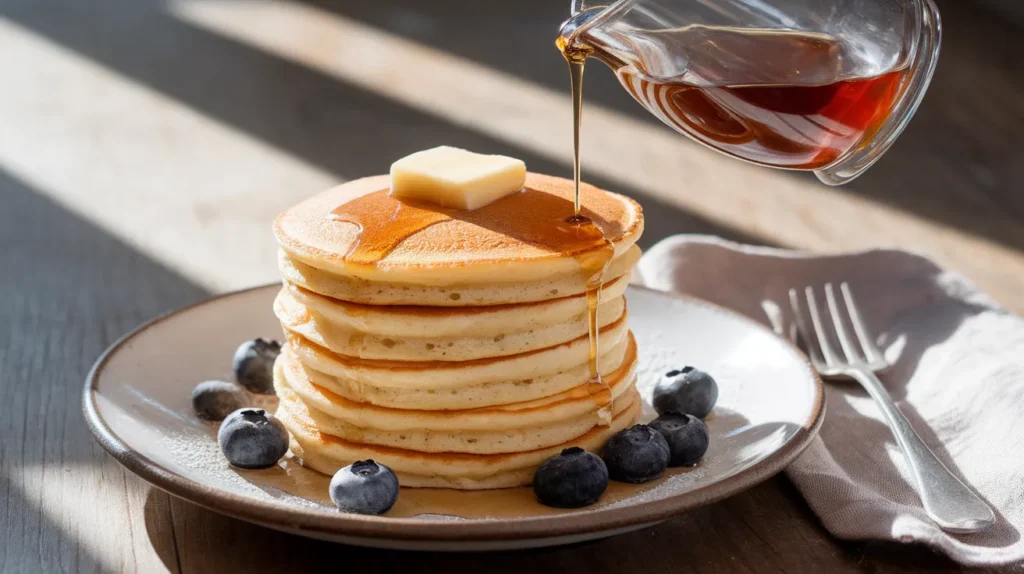
Troubleshooting Common Pancake Problems
Problem: Dense, Heavy Pancakes Your ricotta might have been too cold or you overmixed the batter. Let ricotta reach room temperature and mix just until combined – lumps are okay.
Problem: Pancakes Spreading Too Thin The batter is too runny. This happens when ricotta has excess moisture. Next time, drain ricotta in a fine-mesh strainer for 10 minutes before using.
Problem: Burning Outside, Raw Inside Heat is too high. Lower to medium-low and give pancakes more time to cook through. Patience creates the perfect golden-brown ricotta buttermilk pancakes.
Problem: No Fluffy Rise Check your leavening agents’ freshness. Baking powder and baking soda lose potency over time – they should fizz when mixed with water.
Problem: Sticking to the Pan Your cooking surface isn’t hot enough or needs more fat. Preheat properly and add a thin layer of butter between each batch.
Equipment Essentials
- Large non-stick griddle or skillet (cast iron works beautifully too)
- Two mixing bowls (one large, one medium)
- Whisk for smooth batter mixing
- Rubber spatula for gentle folding
- ¼ cup measuring cup for consistent pancake sizes
- Wide metal spatula for easy flipping
- Fine-mesh strainer if your ricotta needs draining
Shopping List for Ricotta Buttermilk Pancakes
Dairy Section
- Whole milk ricotta cheese (8 oz container)
- Buttermilk (1 pint)
- Large eggs (½ dozen)
- Butter (stick)
Baking Aisle
- All-purpose flour
- Granulated sugar
- Baking powder
- Baking soda
- Vanilla extract
- Salt
Success Secrets from the Pros
1. Room Temperature Ingredients: Let eggs, ricotta, and buttermilk sit out for 30 minutes before mixing. This creates smoother batter and better texture in your final ricotta buttermilk pancakes.
2. The Bubble Test: Wait until bubbles cover the entire surface before flipping. Rushing this step creates undercooked centers and tough texture.
3. Gentle Folding Technique: Use a figure-eight motion when combining wet and dry ingredients. This method distributes everything evenly while minimizing gluten development.
4. Consistent Heat Management: Cook all batches at the same temperature. Starting strong and finishing weak creates uneven results across your stack.
5. Serve Immediately: These pancakes taste best within 5 minutes of cooking. The ricotta’s moisture creates incredible freshness that fades as they sit – similar to how ricotta breakfast toast is best enjoyed fresh.
Pro Tip: Double this recipe and freeze extras for weekday breakfasts. Your future self will thank you when you have restaurant-quality ricotta buttermilk pancakes ready in minutes!
